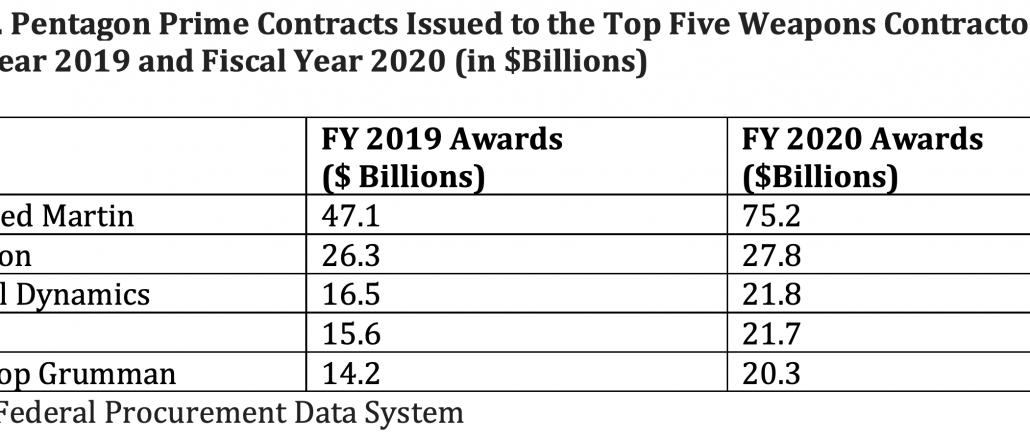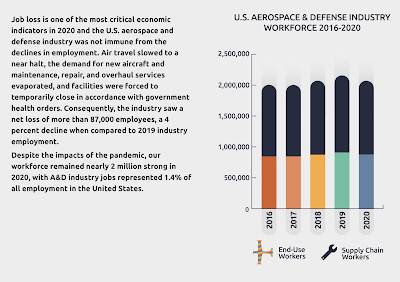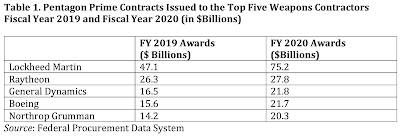
The United States aerospace and defense industry loves to tout its contributions to the American economy as shown here:
…and here:
…but, as we all know (or should know), it is outright war and global geopolitical instability that makes the areospace and defense industry what it is today. With the recent conflict in Ukraine, the corner office dwellers in America's largest defense contractors are positively rubbing their hands together at the profits that will result. Let's look at some of the comments made by the CEOs of Lockheed Martin, Raytheon and Northrop Grumman just prior to the military activity began in Ukraine.
Let's start with comments from Lockheed CEO James Taiclet at the company's fourth quarter earnings call on January 25, 2022.:
"OK. And then on the Future of Your Defense Plan, or FYDP, F-Y-D-P, that is being developed in the first sort of real year of that forward-looking approach is 2023. It's too soon to know what the percentage growth rates in the defense budget are going to be, but our expectation will be that FY '22, which we're already, again, a third of the way through, but it looks like a $740 billion number, would be the baseline upon which 2023 growth would be placed. And then that growth percentage, of course, is going to have to come through the administration and Congress.
But if you look at — and it's evident each day that goes by. If you look at the evolving threat level and the approach that some countries are taking, including North Korea, Iran and through some of its proxies in Yemen and elsewhere, and especially Russia today, these days, and China, there's renewed great power competition that does include national defense and threats to it. And the history of United States is when those environments evolve, that we do not sit by and just watch it happen. So I can't talk to a number, but I do think and I'm concerned personally that the threat is advancing, and we need to be able to meet it.
And the contribution we can make at LM is to increase the efficiency and the reliability of our products that we have today for our customer. And secondly, to try to bring this 21st century digital technology to the enterprise in a way that allows us to keep up with the adversaries while we're developing even newer and more advanced systems."
Now, let's look at comments from Raytheon CEO Greg Hayes at the company's fourth quarter earnings call on January 25, 2022:
"I think the answer is obviously, we are seeing, I would say, opportunities for international sales. We just have to look to last week where we saw the drone attack in the UAE, which have attacked some of their other facilities. And of course, the tensions in Eastern Europe, the tensions in the South China Sea, all of those things are putting pressure on some of the defense spending over there.
So I fully expect we're going to see some benefit from it. I would say, though, that should should there be hostilities, whether it's in the Middle East or whether it's in the Asia-Pacific region you're not going to see an immediate benefit here because what you'll see is a reallocation of inventory that we already have out there with the services. But I fully expect we should see a recovery in the international defense spending and a book-to-bill well north of one as we move into 2022 and beyond. One of the biggest drivers, of course, will be LTAMs (Low Tier Air and Missile Defense Sensor.
And I think again, that's probably a 2023 benefit. We'll start to see bookings then for LTAMs, which, of course, is the upgrade of the Patriot Missile Defense System, but that'll be again a couple of years out."
Lastly, let's look at comments from Northrop Grumman CEO Kathy Warden at the company's fourth quarter 2021 earnings call on January 27, 2022, noting that the company that she heads is getting out of the depleted uranium business because they "no longer want to support it directly", rather, it will be outsourced to another contractor:
"Our ESG strategy also includes portfolio management actions. As we've discussed on earnings calls last year, we committed to transition out of the small aging and surveillance contract that we have for cluster munitions, and that contract is complete. And while we continue to be an ammunition supplier as both a prime and a merchant supplier, we have made the decision to transition our prime role in depleted uranium inhibition to another provider, following one final single production year contract….
So we've taken a very comprehensive look, not only at our strategy, but our portfolio and assessed what that exposure is. I do want to be clear. We are a defense contractor. And so we are supporting global security missions, largely in areas of deterrents, but also inclusive of weapon systems. And we expect to continue in those businesses because we believe they actually promote global human rights proliferation, not the contrary. But with that said, we have evaluated some portions of our portfolio that I've talked about in the past like cluster munitions. And today, making the confirmation that we plan to exit depleted uranium ammo as parts of the portfolio that we no longer wanted to support directly."
I find it disturbing that anyone can talk so casually about the business of killing and maiming other human beings. You would almost think that they are manufacturing mattresses or televisions.
Just in case you were wondering, a study by Brown University's Cost of War Project and the Center for International Policy found the following:
…as well as this:
"The benefits of the post-9/11 surge in Pentagon spending have been highly concentrated. One-quarter to one-third of all Pentagon contracts in recent years have gone to just five major weapons contractors: Lockheed Martin, Boeing, General Dynamics, Raytheon, and Northrop Grumman.
These five companies received over $286 billion in contracts in Fiscal Year 2019 and Fiscal Year 2020 alone. From FY 2001 to FY 2020 these five firms alone split over $2.1 trillion in Pentagon contracts (in 2021 dollars).14 To put these figures in perspective, the $75 billion in Pentagon contracts received by Lockheed Martin in FY 2020 is well over one and one-half times the entire budget for the State Department and Agency for International Development for that year, which totalled $44 billion."
Obviously, the defense sector relies on war for their business. Global insecurity is a big part of their business model; as long as the world remains geopolitically unstable, they stand to increase their profitability which leads to increases in the price of their shares which leads to increases in the compensation packages for their CEOs and other Named Executive Officers. The current conflict in Ukraine is their wet dream come true; the only way that it will get any better for them is if decisionmakers in Washington decide to put boots on the ground to fight against Russia face-to-face.
You can publish this article on your website as long as you provide a link back to this page.




Be the first to comment